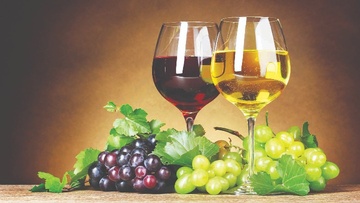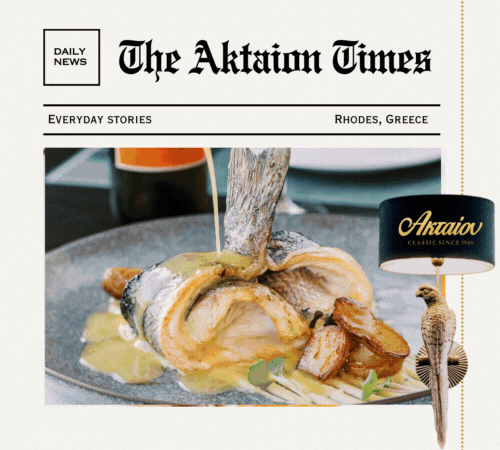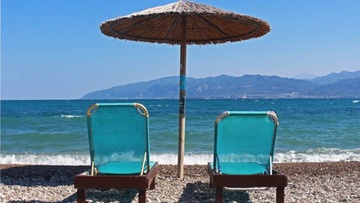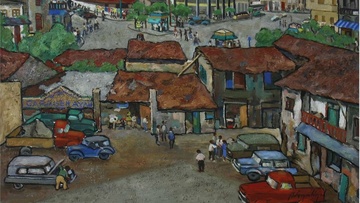Let US have Rhodian Wines…
ΑΝΑΓΝΩΣΤΗΚΕ 423 ΦΟΡΕΣ
By Ranan Richardson
Dionysus was the Olympian god of wine, pleasure and festivities, worshipped by the ancient Greeks. Since the times of antiquity, wine has played an essential role in the history of the Aegean.
Trade routes where developed and economies flourish as a result of this essential “drink of the gods.”
Sitting on the southeastern edge of the Dodecanese islands is “the emerald of the Aegean Sea ”, Rhodes, a gem of the Mediterranean for viniculture. Greece’s fourth largest island, it can proudly claim four recognized appellation of origin (AOC) wines produced from the varietals Athiri, Amorgiano and the two Muscats.
Owing to its pivotal position near Asia Minor, Rhodes has been famous for its wines for over 2400 years. Initially cultivated by the Phoenicians, it is known to be one of the first islands in the Aegean to adopt the cultivation of the grapevine and the vinification process.
Supported by its powerful naval forces, Rhodes became by the middle 7th century BC, the leading merchant of wines and crops, bringing an incredible wealth to the island. Thousands of ancient amphorae bearing the trademark of the Sun God or the rose have been discovered scattering the Mediterranean basin verifying that Rhodian wines quenched the ancient world from Greece to Rome to Egypt.
The island is gifted and the wines are more than unique. A blessed climate, with the longest summer and more sunny days than anywhere else in Greece, a significant rainfall in a well-concentrated period, and cooling winds that mitigate the soil temperature during the strong summer heat, all add up to the perfect climate for viniculture.
Considered one of the richest vineyards of Greece, the vineyards of Rhodes are small and scattered, and grown in two zones, differentiated by altitude. Due to differences in microclimate and soil, each zone produce wines of a different taste and characteristics. All the grapes in both areas are handpicked during the early morning hours before the sunrises starting in late August through late September.
On the northern side of the island on the slopes of Mount Attavyros, in the privileged high zone, the vines are trained into terraces, known as “pezoules”. Having never experienced Phylloxera, a pest of grapevines, many of the vines are 50-60 years old. The cooler climate in these vineyards results in slow ripening, leading to the development of acidity alongside flavor and aroma in the grapes.
The two main grape varieties cultivated here are Athiri , producing a white wine with a gentle aroma and a fresh, fruity taste; and Mandilaria, which in Rhodes is called Amorgiano, producing a red wine with good body and a spicy lively aroma. Rosé wines with fruitiness and a light aroma are also produced from the same grape.
On the lower-lying land in the foothills of the mountain, where the climate is slightly warmer, the red Amorgiano grape variety is planted.
Since antiquity, the island has also been known for its sweet muscats, and sweet wines. Muscat White and Muscat di Trani, an Italian clone of Muscat are both used to produce the islands appellation of origin Muscat, with its aromas of dried apricot, caramel and nuts.
Lastly to celebrate, Rhodes can also claim a tradition in sparkling wine, produced from the Athiri grape, making it the first Greek area to offer a sparkling wine to its people.
Wannabe connoisseurs – TIPS we though you should know that:
1. A good wine should ‘sleep’ (just like people); it should be placed on a sidelong position - so the cork stays damp - , in a dark room with a temperature of 14-18 c.
2. Never place a bottle of wine in the freezer because it is not cool enough. As a living body, it goes through a state of ‘SHOCK’, neither do we store it in the fridge for a long time it alters the taste and the smell!
3. White wine is served at 9-13 degrees, red at 15-18, rose 11-14 and sparkling wine 5-6
4. Red wine-especially the aging one- should be opened 1-2 hours prior to its consumption, alternatively, it may be transferred in a wide-necked carafe so it can breathe and set off its bouquet.
5. It does not matter if we mix wine types during a meal. It is wise to follow the path: first the white, then the rose and finally the red…
YAMAS! CHEERS! To the lovers of superb wine ☺
Taken from THE PAPER
Issue 002 June 2005
Article “A LIFE LIKE WINE”









 Ακολουθήστε τη Ροδιακή στο Google News
Ακολουθήστε τη Ροδιακή στο Google News








